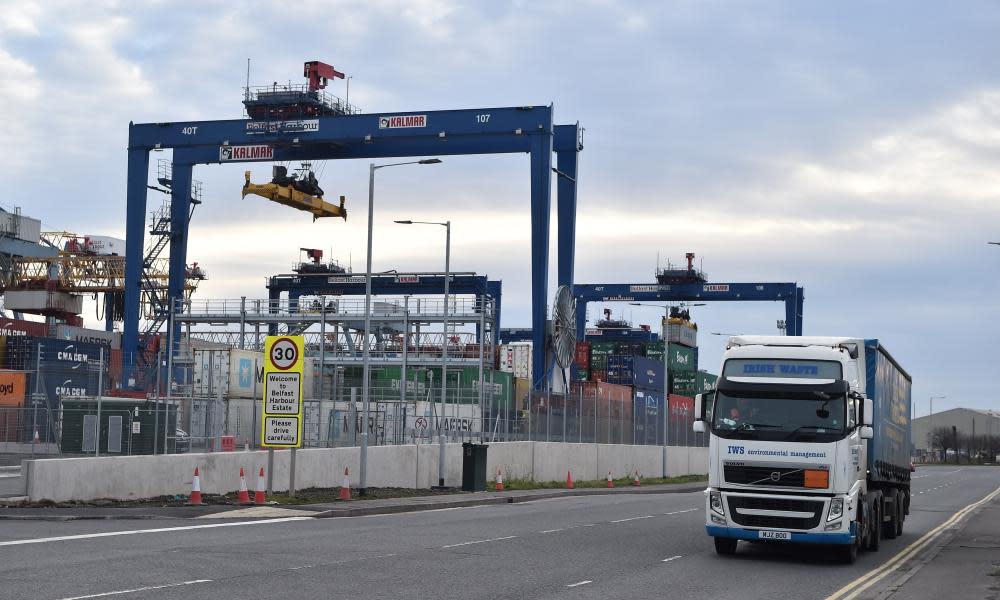Four in 10 UK food firms to cut supplies to Northern Ireland – poll

Four in 10 food and drink businesses have said they are going to stop or reduce supplies going from Great Britain to Northern Ireland because of Brexit, a poll of some of the UK’s biggest producers has found.
The alarming survey result will confirm the worst fears of MPs, particularly those in the Democratic Unionist party (DUP), as well as of retailers and the hospitality sector in Northern Ireland.
Just over 20% of suppliers polled said they were planning to “pause GB-NI deliveries to ensure we can be legally compliant with NI rules”. A further 11.6% said they were going to pause supplies “while we assess if it remains a viable market” with 4.7% saying they would reduce the volume of goods sold from Great Britain to Northern Ireland.
Related: Brexit may reduce our food shipments to Northern Ireland, says Sainsbury's
The survey is the third monthly poll on Brexit conducted by the Food and Drink Federation about business readiness for the end of the transition period. It said it polled 50 members including some of the biggest food suppliers in Britain responsible for household-name brands.
“They are businesses that would be familiar to shoppers,” said Dominic Goudie, the head of international trade at the FDF.
The poll comes just days after Marks & Spencer and Sainsbury’s warned they might have to reduce supplies of certain produce lines to Northern Ireland.
Goudie said many businesses were not clear on what needed to be done post-Brexit to trade in Northern Ireland and were unaware they needed different labelling for the region after 1 January, and that they needed to apply for a specific economic operators registration and identification (EORI) for Northern Ireland.
Up until now trade between Great Britain and Northern Ireland has been seamless, but customs, regulatory and health measures are being put in place from 1 January as part of the Brexit Northern Ireland protocol agreed by Boris Johnson last year.
Goudie said one of the biggest problems was that “there is a real lack of clarity and detail on what actually needs to be done to get products in Northern Ireland, and how the processes of the borders will actually work in practice”, both from the UK and the EU.
While more than 95% of those polled had an EORI number for trading in the UK, only 33% had obtained one with an XI prefix to allow them to continue trading in Northern Ireland. The numbers were being issued automatically by those who registered with a new government contracted body, the Trader Support Service (TSS), in Northern Ireland.
The TSS only launched a few weeks ago and there was no public communications campaign to drive home the message to traders in Britain, said Goudie “Even the cut-off point for registering with TSS to get an NI EORI number was 23 November – if you want to get one now you have to register manually,” he said. “They need to extend that date.”
He backed calls for an “adjustment period” for the Northern Ireland protocol saying businesses needed “in excess of four months” to make the changes needed. “It was 5 November when they updated the labelling guide on the government website. It’s all come too late in the day,” he said.
He said the “light touch” approach in the early weeks that the government has indicated would apply would offer “no legal basis” for trading for companies seeking to indemnify themselves by achieving 100% compliance with local laws.
“They cannot legally sign those forms so that’s a major reason [why they are pausing supplies],” said Goudie.
Many businesses had prepared for Brexit by stockpiling, buying time until the new trading rules to become clearer.
Last month, Northern Irish businesses called for the EU to delay the introduction of the Northern Ireland protocol warning they “simply will not be ready” for the mandatory checks on 1 January.


